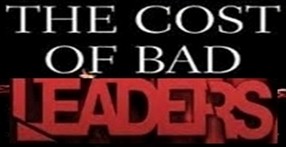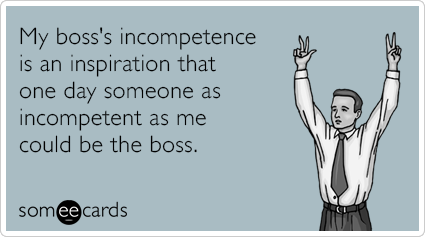The Peter Principle
Why are so many nations and organizations failing in the world? The reason is simple – wrong people are at the helm of affairs and they are the ones calling the shots. When incompetent people get promoted and start taking deadly decisions nations and organizations doom. Dr. Laurence J Peter and Raymond Hull in their 1969 book The Peter Principle, describe that in a hierarchy every person/employee tends to rise to their level of incompetence. And, their incompetence can cause anarchy. They get promoted mainly due to their seniority (number of years in service) or sometimes earlier because of favoritism/ nepotism. When people are promoted as far as they deserve their outputs are the best but sooner or later when they are promoted to a position at which they are not suitable, the problem begins. Managing upward is the concept of a subordinate finding ways to subtly “manage” superiors in order to limit the damage that they end up doing. Some of the damages are irreparable and hence organizations collapse.
I have great regards for our ex Prime Minister Dr. Manmohan Singh’s capability in economic reforms of this country. He’s a great academician and thinker. In 1991, as India faced a severe economic crisis, newly elected Prime Minister P.V.Narsimha Rao surprisingly inducted the apolitical Manmohan Singh into his cabinet as Finance Minister. Over the next few years, despite strong opposition, he as a Finance Minister carried out several structural reforms that liberalized India’s Economy. But, sadly he represented the paradox as Prime Minister of India – possibly because he is so honest and is not a keen politician. He could not play dirty games. Dr.Singh failed presiding over gross dishonesty. The answer to the paradox is, however, simple: it lies in The Peter Principle. Dr. Singh is the ultimate exemplar of the Peter Principle at work.
In an organizational structure, the Peter Principle’s practical application allows evaluation of the potential of an employee for a promotion based on performance in the current job. He might be doing a good job because of various reasons and elements. He must be sharing great rapport with his boss and peers, he must be enjoying the functionality of the job, but no sooner he is promoted in the upward hierarchical position, he might turn out to be a misfit. That level is the employee’s “level of incompetence” where the employee has no chance of further promotion, thus reaching their career’s ceiling in an organization.
The employee’s ineffectiveness is not necessarily exposed as a result of the higher-ranking position being more difficult. It can simply be because of that job is different from the job in which the employee previously excelled, and thus requires different work skills, which the employee may not possess. Let me give you an example: when a good surgeon skilled, very competent both in diagnosis and prognosis gets promoted in a hospital in the administrative position as “Dean” or “Director” he might fumble or fail because of lack of administrative skills. This is not a unique example. In reality, it has been observed that technically qualified people turn out to be poor administrators.
Taking decisions of putting people back in their previous comfort level requires lot of guts. But perhaps the best way to address the Peter Principle in an organization would be to introduce a policy of relegating employees to their fitting level of competence without the stigma of failure. If an employee isn’t working out in a higher position, allowing him to go back to whatever position he excelled in would avoid the bad effects. This would, however, require the supervisor who made the poor promotion decision to admit he made a mistake, an act not often found in the higher levels of a hierarchy.
Another reason of promoting people without checking their competence is nepotism and favoritism. Many nations and organizations suffer because of nepotism. Nepotism is the practice among those with power to influence or to favor relatives or friends. It has a considerable negative effect on Human Resources practice. It creates bad taste besides job satisfaction, quitting intention, and feeling of negativity. It creates lot of tensions and fights among people. Nepotism is indeed an unprofessional phenomenon that provides benefits merely to the family members or close friends. It paralyzes human resource practices and affects the level of satisfaction among employees. We have witnessed in history, and even today, nepotism has created Peter Principle situations in good organization which have only led them to downfall. In a recent article on Forbes.com it is admitted to promoting a culture of nepotism within its own executive stratum. While B.C.Forbes in early 19th century remained heavily involved with the publications for rest of life, he gave top positions to his oldest sons, Malcolm and Bruce. Though Forbes did very well and grew; perhaps the publications would have done much better than they have done till date, if the right persons would handle the affairs at top.
Another solution to the Peter Principle would be paying higher pay without promotions. Employees often accept a promotion not for the power or prestige but the increased pay attached to it. If companies offer higher pay increases for excellent work within the same position, the Peter Principle can be averted to a great extent. While the employee makes more money and he’s comfortable in his competent position.
Peter suggests that a manager who finds himself encumbered with an incompetent employee has the option to get rid of that employee without firing him. Peter suggests giving employees with seniority a longer title with less responsibility. This way the employee still feels important, but is kept away from the important, burning matters, so to speak. Peter also recommends percussive sublimation as a way to get an incompetent employee out of a manager’s hair. In this method, the incompetent employee is simply promoted to another position in another division.
Perhaps the most important factor in avoiding the Peter Principle is an alert employee, one who is aware of the extent of his capabilities. The offer of a promotion is tempting, but the employee must consider the extra responsibilities and jobs that come with it. Of course, the employee can simply turn down a promotion if he feels its afar his capability, an action Peter referred to as Peter’s Parry.
 The Peter Principle advises managements not to gamble with talent management and promotions. Instead take the time to ensure that the right people are in the right roles in an organization. It’s better to ensure that the person has the desire and inclination to be a leader before promoting him/her. If they don’t have inclination, don’t force it on them, but rather create career paths to maximize their contribution and receive the recognition they crave for. There are good numbers of people out there who refuse promotions because they feel burdened and are not keen on making a mess in their career. I think such people are genuine and sincere humans.
The Peter Principle advises managements not to gamble with talent management and promotions. Instead take the time to ensure that the right people are in the right roles in an organization. It’s better to ensure that the person has the desire and inclination to be a leader before promoting him/her. If they don’t have inclination, don’t force it on them, but rather create career paths to maximize their contribution and receive the recognition they crave for. There are good numbers of people out there who refuse promotions because they feel burdened and are not keen on making a mess in their career. I think such people are genuine and sincere humans.
Another thing organizations need to realize is that everyone does not know how to lead. Leading requires lot of maturity, capability and an aptitude; especially the first-time managers fumble when they need to lead seniors and capable people. Before promoting people to higher levels organizations must provide them with objective feedback and coaching early and often. If they easily shift into the role, only then should they be promoted. I think skill broadening and enhancing techniques in regular intervals through training and development is need of the hour to avoid Peter Principle.
















































